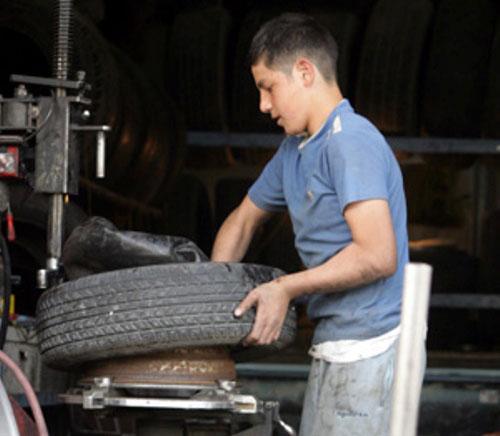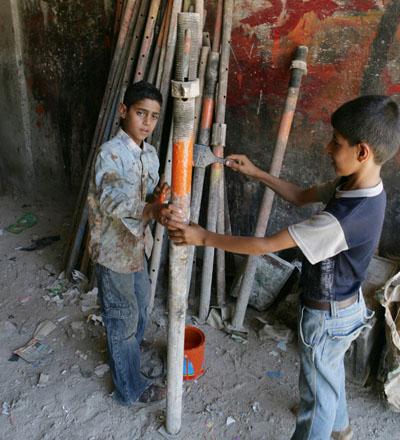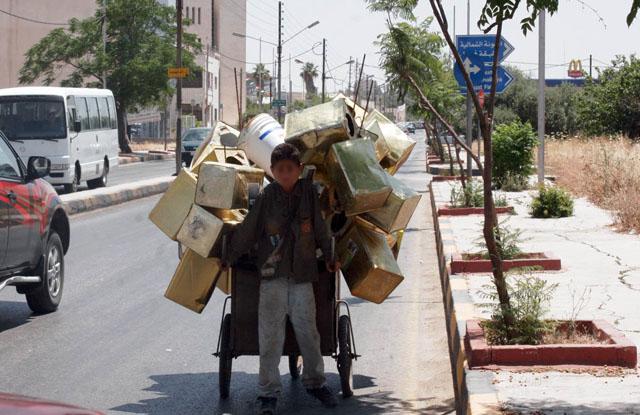You are here
Syrian refugee influx adds to child labour problem
By Hana Namrouqa - Mar 02,2015 - Last updated at Mar 02,2015

AMMAN — Holding a cardboard box stocked with blue and green porcelain turtles, 12-year-old Mahmoud quietly approaches people as they wait for their food orders and asks them if they would like to decorate their cars with his turtles.
Mahmoud asks the customer to pick the colour of the turtle if he said yes and leaves to another potential buyer without pushing if a customer declines to buy.
He is always stationed near a fast-food chain in Abdullah Ghosheh Street in west Amman, where he starts his day at noon and leaves for his house in Sweileh at 9pm.
“I started selling stuff here last year, when I left school to help my family. Sometimes I earn JD5-8, especially on weekends, and on summer days I can even collect JD15-20,” Mahmoud, not his real name, told The Jordan Times.
Mahmoud doesn’t mind the fact that he left school and is working to help his father “bring more money”, yet he wishes he could “stay off the street”.
“It’s tiring, and the weather is cold these days… Also, people sometimes are not good to me, they think I’m a beggar,” Mahmoud said.
On Rainbow Street in Jabal Amman, a 14-year-old Syrian boy, Safwan, sells Arabic coffee to pedestrians and drivers.
“My mother makes the coffee in the morning… I, my father and two siblings come to Rainbow Street every day. They sell Syrian sweets and I sell Arabic coffee,” Safwan said.
Safwan and his family fled to Jordan two years ago from Aleppo and are staying in a small apartment in Hay Nazzal in southwest Amman.
Despite the absence of recent official figures that identify the number of working children in the Kingdom, a survey on child labour conducted in 2008 put their number at 30,000, according to the Ministry of Labour.
Officials at the ministry said that the number has at least doubled since the survey was carried out seven years ago, especially with the arrival of the Syrian refugees.
As the ministry said that half the number of child labourers seized by authorities every day are Syrians, UNHCR figures indicate that 53 per cent of Syrian refugees in Jordan are below 18 years old.
Ayman Khawaldeh, head of the ministry’s inspection directorate, said that the ministry will soon start field surveys on child labour in car garages, factories, coffee shops and other sectors where underage workers are being employed.
The inspection and surveys seek to identify those who employ children who are below the legal working age of 16 years old and also to identify the number of working children in the local market, their nationalities and in which sectors they are found.
“The survey will assist efforts to curb child labour,” Khawaldeh underscored.
The official said that in 2014, the inspection directorate handled 1,316 cases of child labour, 414 of which were Syrian refugees.
A total of 799 institutions employing children received warnings and 285 institutions were fined.
“Forty per cent of the discovered child labour cases were found in the car repair sector,” he highlighted.
The International Labour Organisation released in June last year the Report on Child Labour in the Urban Informal Sector in Amman, Mafraq and Irbid, which indicated that children in the three governorates work in a range of occupations, but are most frequently present in the services industry, where they are employed as shop cleaners or assistants.
Older children are also found in more hazardous environments, including metal working/welding and heavy manual labour, such as lifting, according to the report.
The majority of child labourers in urban environments are working six to seven days per week, and between four to eight hours per day, according to the report, which also showed that child labourers earn between JD3 and JD5 per day and are mainly found working on the street, in shops and in restaurants.
What concerned officials and organisations have not said is whether there are any other alternatives for Mahmoud, Safwan and their families.
Related Articles
The Labour Ministry fined and issued warnings to 74 institutions in March for employing children, a government official said Monday.
SFAX, Tunisia — Three rescued loggerhead turtles were released into the Mediterranean off Tunisia on Sunday, one with a tracking beacon glue
Child labourers in urban environments earn between JD3 and JD5 per day and are mainly found working on the street, in shops and in restaurants, according to a report released on Monday.














